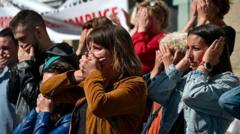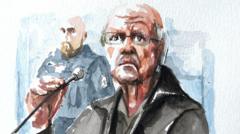In Vannes, victims of retired surgeon Joel Le Scouarnec, who confessed to abusing 299 children, express frustration over society's indifference to this landmark trial. As they fight for recognition, they challenge France's troubling silence on the issue of child abuse, hoping to spark societal change.
Unmasking Silence: France Confronts its Darkest Child Abuse Case

Unmasking Silence: France Confronts its Darkest Child Abuse Case
The trial of Joel Le Scouarnec reveals disturbing truths about child abuse in France, igniting a call for change among victims who feel ignored by society.
The seaside town of Vannes, in Brittany, stands at the center of a legal storm that was expected to challenge the very fabric of French society. The trial of Joel Le Scouarnec, a retired surgeon who confessed to the horrifying sexual abuse of 299 minors, was anticipated to be a pivotal moment. Instead, it has left many victims feeling disheartened and overlooked, amidst louder public discussions surrounding other abuse cases.
One victim, Manon Lemoine, 36, articulated her deep disappointment to the BBC, stating, "I'm exhausted. I'm angry. Right now, I don't have much hope. Society seems totally indifferent.” Along with roughly 50 other survivors, Lemoine has taken matters into her own hands, forming a campaign group advocating for the recognition of their harrowing experiences. The group is determined to pressure the French government for a parliamentary inquiry into a case they believe is emblematic of a larger systemic failure.
The victims, many of whom initially chose anonymity, have recently decided to publicly reveal their identities in a bid to draw attention to the case, hoping to stir a response from the apathetic public. The trial has unearthed shocking details of how Le Scouarnec meticulously recorded his assaults in notebooks, often targeting young patients at their most vulnerable moments.
Despite the scale of these crimes, prominent activists question why the trial has failed to mobilize widespread outrage. According to Maëlle Nori from the feminist organization Nous Toutes, the sheer number of victims may be leading to a collective sense of numbness. “Perhaps because of the number of victims, we hear the disappointment,” she said.
This trial starkly contrasts with the previous Pelicot mass abuse case, which attracted intense media attention. A lack of relatable figures, combined with society's often uncomfortable stance on discussing child sexual abuse, has led to the absence of public visibility for Le Scouarnec's horrific actions, according to Myriam Guedj-Benayoun, a lawyer for several victims.
“There's a virtual omertà on this topic globally, but particularly in France. We simply don't want to acknowledge it,” Guedj-Benayoun lamented during her closing arguments, condemning France's silence surrounding child abuse issues. The trial has revealed deep-rooted institutional failures, as medical professionals explained their reluctance to act against Le Scouarnec due to “a shortage of surgeons,” and a culture of silence that permitted the violence to persist, often in plain sight.
Amid this grim context, some survivors are finding empowerment through shared testimony, transforming the trial into an unintentional support group. Lemoine encapsulated the sentiment of the group by stating that their public revelation is a step toward liberation from their pasts. “We lay out our pain and our experiences and we leave it behind [in the courtroom]. So, for me, really, it was liberating,” she shared.
Currently on the brink of sentencing, Joel Le Scouarnec is widely expected to receive a guilty verdict and face lifelong imprisonment. Yet, the spirits of the victims remain intertwined with their desire for broader societal recognition and change. “We need to unite. We have to do this, otherwise nothing will happen, and the Le Scouarnec trial will have served no purpose,” expressed child rights advocate Arnaud Gallais.
As the trial concludes, many are left pondering whether it will be a catalyst for change or merely another chapter in a long history of silence surrounding child abuse in France. “Now, there is a very important standoff… Who will win?” Guedj-Benayoun asked, underscoring the battle between those seeking justice for child victims and those attempting to maintain a veil of silence over such tragedies.
One victim, Manon Lemoine, 36, articulated her deep disappointment to the BBC, stating, "I'm exhausted. I'm angry. Right now, I don't have much hope. Society seems totally indifferent.” Along with roughly 50 other survivors, Lemoine has taken matters into her own hands, forming a campaign group advocating for the recognition of their harrowing experiences. The group is determined to pressure the French government for a parliamentary inquiry into a case they believe is emblematic of a larger systemic failure.
The victims, many of whom initially chose anonymity, have recently decided to publicly reveal their identities in a bid to draw attention to the case, hoping to stir a response from the apathetic public. The trial has unearthed shocking details of how Le Scouarnec meticulously recorded his assaults in notebooks, often targeting young patients at their most vulnerable moments.
Despite the scale of these crimes, prominent activists question why the trial has failed to mobilize widespread outrage. According to Maëlle Nori from the feminist organization Nous Toutes, the sheer number of victims may be leading to a collective sense of numbness. “Perhaps because of the number of victims, we hear the disappointment,” she said.
This trial starkly contrasts with the previous Pelicot mass abuse case, which attracted intense media attention. A lack of relatable figures, combined with society's often uncomfortable stance on discussing child sexual abuse, has led to the absence of public visibility for Le Scouarnec's horrific actions, according to Myriam Guedj-Benayoun, a lawyer for several victims.
“There's a virtual omertà on this topic globally, but particularly in France. We simply don't want to acknowledge it,” Guedj-Benayoun lamented during her closing arguments, condemning France's silence surrounding child abuse issues. The trial has revealed deep-rooted institutional failures, as medical professionals explained their reluctance to act against Le Scouarnec due to “a shortage of surgeons,” and a culture of silence that permitted the violence to persist, often in plain sight.
Amid this grim context, some survivors are finding empowerment through shared testimony, transforming the trial into an unintentional support group. Lemoine encapsulated the sentiment of the group by stating that their public revelation is a step toward liberation from their pasts. “We lay out our pain and our experiences and we leave it behind [in the courtroom]. So, for me, really, it was liberating,” she shared.
Currently on the brink of sentencing, Joel Le Scouarnec is widely expected to receive a guilty verdict and face lifelong imprisonment. Yet, the spirits of the victims remain intertwined with their desire for broader societal recognition and change. “We need to unite. We have to do this, otherwise nothing will happen, and the Le Scouarnec trial will have served no purpose,” expressed child rights advocate Arnaud Gallais.
As the trial concludes, many are left pondering whether it will be a catalyst for change or merely another chapter in a long history of silence surrounding child abuse in France. “Now, there is a very important standoff… Who will win?” Guedj-Benayoun asked, underscoring the battle between those seeking justice for child victims and those attempting to maintain a veil of silence over such tragedies.




















